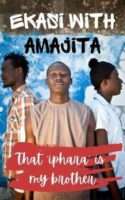One day I was walking to the shopping centre that is not far from where I stay. I had just crossed a busy road when I heard someone calling my name. I looked back but I did not see anyone that I recognised. I carried on with my walk until I heard the person calling my name again but he was about two feet behind me this time.
I turned around and I saw this guy whose face was smeared black with oil that had dried up. His hands were greasy and his clothes were torn.
“Luks ugrand mfowethu,” he greeted me.
It took me some moments to recognise this guy. We used to play soccer together when we were young and he was very good at it. We became quite close but he always made excuses for me not to visit him at his home.
We lost contact when I started high school as I focused more in school and quit soccer. The guy was still battling with grade 5 at the time even though he was two years older than me.
More than a decade later he still remembered me. He left his trolley that was half filled with scrap material unattended and ran after me just to greet me.
I found out that this guy ended up quitting primary school and began collecting scrap material. His mother was an alcoholic and they were living below the poverty line. That is probably why he didn’t want me to visit him at his home. He was ashamed of his home situation.
I remembered he used to wear the same clothes more than four days in a week but the coach would buy soccer boots for him because he was the star of the team.
Most of amajita that also know him from our old soccer days turn other way around when they come across him. They say he chose to become iphara instead of finishing school like most us.
Unlike you majita, I still remember what the coach would say when we were fighting with each other during practice.
“You are brothers,” he would say, “and brothers dont fight with each other.”
That iphara is my is my brother. That iphara is your brother too majita. Life is not fair to everyone and we shouldn’t look down to other people because they are in worst situations.
According to Africtionary, iphara which is also known as iphara-phara in some communities is a term that is given to a drug addict who often commits criminal activities. However, we have now become a community that assumes that anyone who is seen wearing torn dirty clothes is an iphara. This is a dangerous assumption to make. Innocent people have lost their lives simply because of the way they look. People have been wrongfully accused of committing crimes such as house-breaking and armed robbery.
While it is true that we have amaphara that terrorise our communities, it is safe to note that not everyone who knocks at your front door asking for food is making an excuse to see what they can steal from your house.
Some people are genuinely in dire need of financial assistance and they don’t have a cold heart in them to hurt someone to get what they want. For example, lo mjita that I haven’t seen in over a decade had decided to make a living out of collecting and selling scrap material. This is the only work that he knows. While most of us waited on our parents to eat, he pushed a trolley to the scrap yard to eat.
On TV, internet and newspapers there are prominent people who continuously lecture us about the importance of recycling in our communities. We find the guys we call amaphara scavenging for scrap material in our bins on the days that the garbage trucks come to collect the trash. They can’t knock in our houses any time of the week and ask for scrap because we assume the worst of them.
Assumptions don’t build, they destroy. Take time to know and understand someone’s background before putting a label on them. Some people were not what they are today before the assumptions you made yesterday. Some people were not housebreakers before you screamed for help from your neighbours when they knocked on your door asking for food.
Amaphara are our brothers. Lets support and respect amaphara that wake up in the morning and rid our streets of the soda cans that we dispose so carelessly. Let’s give them respect for choosing an honest living rather than breaking into our houses.
Are we a thirsty generation? Read here to learn more.
Tell us: Do you agree with the author? Why or why not?


